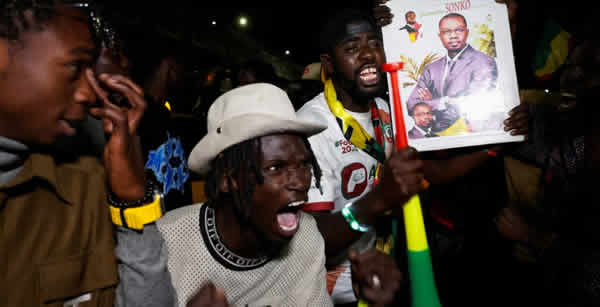
Senegal opposition candidate Bassirou Diomaye Faye was set to be declared the country’s next president after his rival from the ruling coalition called him Monday to concede defeat.
Results trickling in since polls closed Sunday evening in the first round of a delayed presidential election rapidly suggested Faye, 44, may have clinched an outright majority. The trends announced on local media sparked street celebrations by his supporters in the capital Dakar.
Ruling coalition candidate Amadou Ba, 62, initially called these celebrations premature and said a run-off vote would be needed to determine the winner.
But he then called Faye on Monday to offer his congratulations, a government spokesperson told journalists.
“In light of presidential election result trends and while we await the official proclamation, I congratulate … Faye for his victory in the first round,” Ba said in a statement.
A peaceful transition of power in Senegal would mark a boost for democracy in West Africa, where there have been eight military coups since 2020.
Some of the juntas that seized power have cut ties with traditional powerbrokers in the region such as France and the United States and turned instead to Russia for help in their fight against a jihadi insurgency spreading through countries that neighbor Senegal.
Senegal’s international bonds rose on reports that Faye was close to being declared a winner, reversing sharp falls from earlier in the day.
Official results are expected to be announced by the Dakar appeals court Friday. The electoral commission has not yet communicated on the tallies counted so far out of 15,633 voting stations.
Many hope the vote will bring stability and an economic boost to Senegal after three years of unprecedented political turbulence in one of West Africa’s only stable democracies, which is set to start producing oil and gas this year.
“I am happy to see there is a wind of change,” said Tall, who joined revelers during the night as supporters waved Senegalese flags, lit flares and blasted vuvuzelas (molded plastic horns).
“It is wonderful because democracy has won. Many thought it would not happen,” he said, only wishing to give his first name.
Young voters
Several opposition contenders had also conceded defeat to Faye during the night, including Anta Babacar Ngom, the only woman running.
Ba was the candidate backed by outgoing President Macky Sall, who is stepping down amid a drop in popularity after two terms in office marred by economic hardship and violent anti-government protests.
Faye has not publicly spoken since he cast his vote. He owes much of his success to the backing of firebrand opposition leader Ousmane Sonko, who was barred from running due to a defamation conviction.
The two former tax inspectors have campaigned together under the slogan “Diomaye is Sonko,” promising to fight corruption and prioritize national economic interests.
They are particularly popular among young voters in a country where more than 60% of people are under 25 and struggle to find jobs.
Police crackdowns on protests, the government’s failure to cushion rising living costs and concerns Sall would seek to extend his mandate beyond constitutional limits buoyed the opposition.
Anger crystalized around Sonko’s prosecution only grew when authorities sought to postpone the vote, initially scheduled to take place in February, by 10 months.
Investors are meanwhile wary about a potential change in leadership to an anti-establishment government that may not pursue the same business-friendly policies seen under Sall’s government that has attracted investments into infrastructure.











